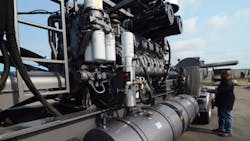Microsoft's Azure Cloud Offers Accountability from the Field
M.G. Bryan, a Dallas-based manufacturer of large equipment in the oil and gas industry, has uncovered a serious deficit in the industry costing companies millions in lost revenue and damages: accountability.
The company's massive hydraulic fracturing units are deployed into the harshest of conditions, to split ground for gas extraction. In general, these $1.1 million machines are operated by employees with limited training, which presents an enormous risk potential.
"You're paying a guy $18 an hour to go onsite with a $30 million spread of equipment," explained Benjamin Blackwell, electrical controls engineer at M.G. Bryan. Under these conditions, to ensure the equipment is safe and operating appropriately, managers need access to real-time data on the equipment and operations -- data that simply did not exist.
To address this, M.G. Bryan has teamed up with Rockwell Automation (IW 500/179) and Microsoft Corp. (IW 500/16) to develop an innovative system to provide real-time intelligence on the state of equipment in the field, which promises to dramatically alter the current model and drive new value by saving the dramatic costs associated with damaged or under-maintained equipment.
This system relies on one piece of transformative technology: the cloud.
The Cloud
"Microsoft's Windows Azure cloud finally gives M.G. Bryan and our customers asset accountability," said M.G. Bryan President, Matt Bryan. "Nobody has ever really had that in our industry. I think this truly has the opportunity to be an industrial revolution as far as what we're doing today."
The system tracks operations of the heavy equipment deep in the field in real-time, monitoring everything from fuel levels to critical system alerts and broadcasting that intelligence over the cloud to the desktops and mobile devices of the managers responsible for keeping them in services and executives responsible for the bottom line.
In doing so, said Bryan, the system makes every user of the equipment accountable for its operation and maintenance, so they can get the maximum life and use out of every component. In the end, this translates to increased operational efficiency across the system.
If monitored properly, Bryan said, a customer can detect potential system failures before they occur and bring the trucks in for a repair or even send replacement parts for onsite maintenance. With the high cost of truck components -- $230,000 for the engine alone -- an early catch on a system in need of maintenance can save the company hundreds of thousands of dollars.
"If we can give them advanced notification to stop, this system can pay for itself literally three or four times by saving one piece of equipment," said Bryan. "If it saves the engine, if it saves the transmission, if it saves a pump, it can pay for itself in one incident."
The Windows Azure cloud, explained Enrique Andaluz, industry solutions manager at Microsoft, is critical to this new capability.
Windows Azure
"The cloud is offering a new way of doing business. I don't think anybody has seen the real power of the cloud. It creates an interconnected world like never before," he said. "It presents a fundamentally new business model and a new way of creating value for the customer at the end of the day."
The cloud is uniquely capable of providing this new level of service, said John Dyck, global director, Software Business Development at Rockwell Automation.
"When an end-user ships a machine, whether its a small single machine or its a big complex line with lots of equipment, the requirement for software requires fairly significant PC or server hardware on it, which means in many cases, requires unrealistic costs."
With this new technology, however, users can put that information into the cloud in a secure and reliable way with infinitely scalable infrastructure capable of creating value for one or 10,000 trucks, he said.
"This puts the onus on Microsoft to scale up the infrastructure and all we do is keep adding trucks," he said. "M.G. Bryan can add all the infrastructure we need on the backend to suit the user requirements and the data collection requirements as the numbers of machines or trucks grows over time."
In other words, utilizing the cloud allows every provider to focus on its own specialty -- Microsoft maintains the security, real-time feeds and reliability, while Rockwell maintains the automation and reporting structure and M.G. Bryan keeps their trucks in operation.
This combined expertise provides M.G. Bryan customers access to the best possible tools to keep their assets in the best possible condition, said Bryan.
"If youre a ditch digger, if you the best pick or the best shovel, you're going to be the fastest ditch digger. But if your equipment is limping along or you've got a broken handle, you're not going to be the fastest ditch digger," he said.
"What we're trying to do is keep that equipment up because it is truly a tool. With $5-$10 million of expenses, we can retrofit an entire fleet of these vehicles and have the best fleet in North America with this system and with the cloud."
See Also:
About the Author
Travis M. Hessman
Editor-in-Chief
Travis Hessman is the editor-in-chief and senior content director for IndustryWeek and New Equipment Digest. He began his career as an intern at IndustryWeek in 2001 and later served as IW's technology and innovation editor. Today, he combines his experience as an educator, a writer, and a journalist to help address some of the most significant challenges in the manufacturing industry, with a particular focus on leadership, training, and the technologies of smart manufacturing.
